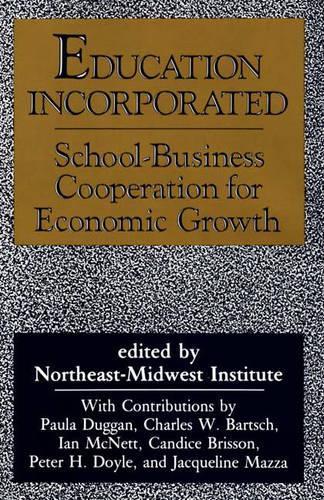
Education Incorporated: School-Business Cooperation for Economic Growth
(Hardback)
Publishing Details
Education Incorporated: School-Business Cooperation for Economic Growth
By (Author) Richard Munson
Bloomsbury Publishing PLC
Praeger Publishers Inc
8th June 1988
United States
Classifications
Tertiary Education
Non Fiction
331.110973
Physical Properties
Hardback
218
Description
Education Incorporated identifies ways education and business can work together to build a strong economy. While recognizing that schools and companies have different roles to play in the public arena, the focus is on what happens when their interests overlap. Describing formal and informal programs already underway, the book suggests specific actions to use existing resources and talents cooperatively. It also shows what government can do to promote collaborations between these sectors. Specific papers discuss ways in which education can find new uses for its buildings and resources, develop and expand training services to develop workforce potential, make use of research capacity and faculty expertise for business applications, and create flexible funding strategies to support their services to business and industry.
Reviews
It is becoming increasingly obvious that the educational system does not adequately interface with the business community, and as a consequence many young people are unable to become productive members of society and many older workers endure long periods of structural employment. This collection contains suggestions and a summary of efforts to mesh more precisely the needs of the business community with the resources of the educational system. At the primary and secondary levels emphasis is placed on basic skills and "learning to work" programs. At the postsecondary level, attention is focused on the community college as a device to assist workers in retraining and as a resource for small businesses. Not only the intellectual but also the physical resources of colleges and universities can be used to create jobs and increase growth. The community college is in a key position to respond to the needs of local workers and businesses. And at the university level, greater cooperation may allow basic research to more quickly find marketable outlets, and the cross-fertilization of ideas between the firm and the university will enhance productivity.-Choice
Part I of this book argues that education must find new uses for its facilities and resources and expand its training services, particularly "learning to work" programs and programs for developing adult basic skills. In Part II, collaborations of business and higher education are discussed. The special capabilities of two-year institutions are outlined, including their "one-stop assistance" to business, flexibility in technical training, foreign trade and contract help, and their role as laboratories for the workplace and technology transfer agents. Two chapters examine ways that educational institutions and federal and state lawmakers can redirect unemployment insurance from a passive maintenance program to an active economic adjustment tool; the Jobs Training Payments Act, worksharing, state-initiated training funds, and European self-employment programs are discussed. Finally, business-higher education development strategies are examined, such as the organization of informal university-industry networks, use of universities as business consultants, university-operated industrial extension services, cooperative research, and affiliate programs. Successful collaborative programs between business and education are highlighted throughout the book.-Higher Education Abstracts
"It is becoming increasingly obvious that the educational system does not adequately interface with the business community, and as a consequence many young people are unable to become productive members of society and many older workers endure long periods of structural employment. This collection contains suggestions and a summary of efforts to mesh more precisely the needs of the business community with the resources of the educational system. At the primary and secondary levels emphasis is placed on basic skills and "learning to work" programs. At the postsecondary level, attention is focused on the community college as a device to assist workers in retraining and as a resource for small businesses. Not only the intellectual but also the physical resources of colleges and universities can be used to create jobs and increase growth. The community college is in a key position to respond to the needs of local workers and businesses. And at the university level, greater cooperation may allow basic research to more quickly find marketable outlets, and the cross-fertilization of ideas between the firm and the university will enhance productivity."-Choice
"Part I of this book argues that education must find new uses for its facilities and resources and expand its training services, particularly "learning to work" programs and programs for developing adult basic skills. In Part II, collaborations of business and higher education are discussed. The special capabilities of two-year institutions are outlined, including their "one-stop assistance" to business, flexibility in technical training, foreign trade and contract help, and their role as laboratories for the workplace and technology transfer agents. Two chapters examine ways that educational institutions and federal and state lawmakers can redirect unemployment insurance from a passive maintenance program to an active economic adjustment tool; the Jobs Training Payments Act, worksharing, state-initiated training funds, and European self-employment programs are discussed. Finally, business-higher education development strategies are examined, such as the organization of informal university-industry networks, use of universities as business consultants, university-operated industrial extension services, cooperative research, and affiliate programs. Successful collaborative programs between business and education are highlighted throughout the book."-Higher Education Abstracts
Author Bio
Richard Munson is Director of the Northeast-Midwest Institute, a non-partisan policy research center in Washington, D.C. Having founded the National Solar Lobby and Center for Renewable Resources in the 1970s, he has spent the last 25 years spearheading innovative public policy approaches to help meet America's energy needs. He frequently testifies before Congress, collaborates with regional energy and power providers, briefs local and state governments on their energy options, and provides consumer information on energy choices. His articles on the business and politics of the electricity industry have appeared in publications ranging from The Washington Post and Los Angeles Times to the journals of the National Academy of Sciences, environmental organizations and utility associations. He is the author of The Power Makers, Cousteau: The Captain and His World, and The Cardinals of Capitol Hill.
